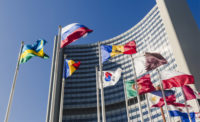FAO Helps Improve Food Safety in ASEAN

The Food and Agriculture Organization of the United Nations (FAO) has improved consumer health and boosted the trade of food in Southeast Asia through a series of multi-year projects. The projects were funded by the government of Japan and aimed at capacity building to develop and implement international food safety standards in member countries of the Association of Southeast Asian Nations (ASEAN).
ASEAN's member countries include Brunei Darussalam, Cambodia, Indonesia, Lao People’s Democratic Republic, Malaysia, Myanmar, the Philippines, Singapore, Thailand, and Vietnam. Within the region, capacity levels vary widely and food cultures are diverse, leading to various food safety issues. Many consumers in these countries prefer street food. Harmonizing food safety measures with Codex Alimentarius standards can help minimize trade restrictions, officials say.
More than 14 training courses were held between 2016 and 2019 to strengthen capacity to contribute to the Codex standard-setting process and implement adopted standards. There was a need to focus on generating evidence on food safety hazards and their level of risk for consumers.
The courses covered topics such as inspection systems, food recalls and traceability, mycotoxin sampling tools, establishing maximum residues limits, and sanitary and phytosanitary measures.
Results have contributed to improving consumer health, facilitating food trade, and better collaboration between ASEAN and trading partners such as Japan. ASEAN countries have also gained knowledge on issues such as risk analysis and categorization. In addition, effective and harmonized food safety capacities support increased trade of food and agricultural products.
Looking for a reprint of this article?
From high-res PDFs to custom plaques, order your copy today!






